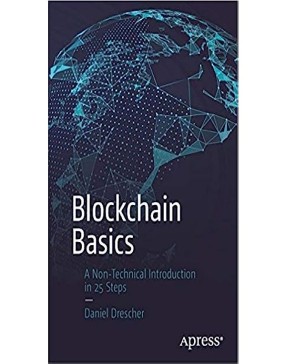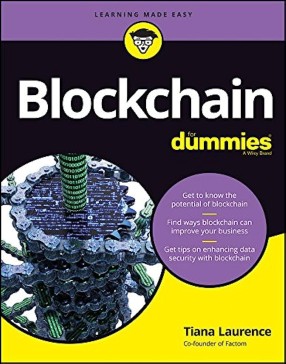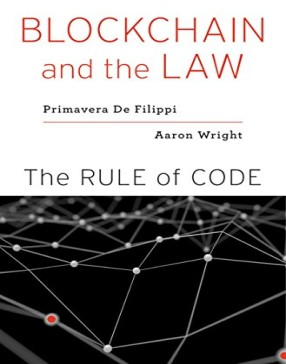The Top 5 Best Books on Blockchain Technology
Introduction
One of the most cutting-edge technologies of this century is cryptocurrency. It has an effect on everything, from financial portfolios to the economy. However, there are a lot of books that can help you learn more about Blockchain technology, regardless of whether you are an expert or a novice.
Blockchain technology must already be familiar to you if you’re a project manager, consultant, online freelancer, entrepreneur, or consultant. The technology that is used to change the way transactions are done is called blockchain. By 2024, it is anticipated that the market for blockchain technology will generate approximately $20 billion globally. By 2025, integrated blockchain spending will reach $5.6 billion, with 55% of healthcare-related applications adopting blockchain for commercial deployment.
Blockchain books are a fantastic way to begin your education. The following is a list of our top 5 best books on blockchain technology that you must read. Don’t forget to check out some fantastic blockchain-related books, which we will be recommending along the way!
Topics Covered In This Article:
- Daniel Drescher’s “Blockchain Basics” this book is a great place to start for beginners because it gives a good overview of blockchain technology.
- “Managing Supply Chain Operations” by Andreas M. Antonopoulos provides insights into how blockchain can improve supply chain management’s transparency and efficiency. It focuses on the intersection of blockchain and supply chain management.
- “Blockchain For Dummies” by Tiana Laurence written for newcomers, simplifies difficult concepts to make blockchain understandable to a broad audience.
- “Blockchain and the Law: The Rule of Code” by Primavera De Filippi & Aaron Wright the legal implications of blockchain are examined in depth in this book, including smart contracts, data privacy, and regulatory considerations.
- “The Truth Machine: The Blockchain and the Future of Everything” by Paul Vigna & Michael J. Casey is a comprehensive understanding of the ramifications of blockchain technology provided in this thought-provoking book. It examines the disruptive potential of blockchain technology across a variety of sectors.
“Blockchain Basics: A Non-Technical Introduction” By Daniel Drescher

“Blockchain Basics” by Daniel Drescher is a great book to start if you want to learn more about blockchain technology and its potential uses. Prepare to learn more about blockchain technology and embark on an exciting journey there!
A. Overview of the book’s content and target audience
If you want to learn the fundamentals of blockchain technology, this book is a great choice. This book has something useful for everyone, from a complete guide to a basic understanding.
Daniel Drescher has done an excellent job of simplifying difficult concepts into easily understandable pieces of content. The book is approachable and friendly, making it suitable for readers of all types. Therefore, this book is suitable for tech enthusiasts, curious students, and professionals looking for knowledge expansion.
B. Summary of key concepts covered in the book
You will be taken on a journey through the fundamental components of blockchain technology by Drescher. He explains how blockchain works, its fundamentals, and the various blockchain networks that are available.
Decentralized consent, smart contracts, and cryptographic methods utilized in blockchain systems are also covered. Drescher doesn’t avoid talking about the possible utilizations of blockchain across different businesses, for example, finance, supply chain, and medical care.
Drescher provides real-world examples and case studies throughout the book to demonstrate the practical applications of blockchain technology. By the time you reach the end, you will have a solid grasp of the fundamental ideas and the skills to participate in insightful discussions about blockchain.
The following are some important takeaways from “Blockchain Basics”:
- Learn how blockchain technology works.
- The significance of decentralization and how it affects conventional systems.
- How blockchain networks are protected by cryptography.
- Investigate the idea of shrewd agreements and their true capacity for mechanizing processes.
- Learn about the various consensus algorithms and why they are important for keeping the integrity of the blockchain.
- Learn about real-world applications that go beyond cryptocurrencies.
- Recognize possible open doors and difficulties blockchain presents for different businesses.
“Managing Supply Chain Operations” By Andreas M. Antonopoulos

“Managing Supply Chain Operations” by Andreas M. Antonopoulos is a must-read that will expand your horizons and inspire innovative thinking, whether you are a supply chain professional or simply interested in the future of logistics. You will have a solid understanding of how blockchain can make supply chain operations safer, more effective, and more reliable.
A. Overview of the book’s content and target audience
“Managing Supply Chain Operations,” written by Andreas M. Antonopoulos, will take you into the fascinating world of supply chain operations. Professionals and enthusiasts who are interested in understanding and enhancing supply chain processes will find this book to be an invaluable resource.
Antonopoulos, who is well-known for his expertise in blockchain technology, contributes his wealth of knowledge to the discussion of how supply chain operations can be transformed by blockchain. This book is made just for you if you’re a supply chain manager, logistics expert, or even an entrepreneur looking to make your business processes work better.
B. Summary of key concepts covered in the book
Antonopoulos takes you on a captivating journey through the intersection of supply chain management and blockchain technology in “Managing Supply Chain Operations.” He goes into detail about how blockchain could improve supply chain transparency, referable, and efficiency.
You will learn about the idea of decentralized applications, or DApps, and how they help processes in the supply chain run more smoothly. In addition, Antonopoulos explains how smart contracts and cryptocurrencies can revolutionise payment systems and automate prescribed agreements, facilitating smoother and safer transactions.
Let’s take a look at what “Managing Supply Chain Operations” will teach you:
- Recognize the difficulties faced by conventional supply chain operations.
- Explore the ways in which blockchain technology can improve supply chain traceability and transparency.
- Decentralized applications (DApps) have the potential to simplify supply chain procedures.
- How cryptocurrencies are changing supply chain payment systems.
- How smart contracts can streamline operations and automate contractual agreements?
- Learn about real-world use cases and supply chain management success stories using blockchain.
“Blockchain For Dummies” By Tiana Laurence

You will have a solid understanding of blockchain technology and the skills to have insightful discussions about this cutting-edge field. Therefore, “Blockchain For Dummies” by Tiana Laurence is the ideal starting point for the potential of this revolutionary technology, whether you’re a curious individual or a professional seeking a deeper understanding of the technology.
A. Overview of the book’s content and target audience
“Blockchain For Dummies,” written by knowledgeable author Tiana Laurence, is a great book to begin your exploration of blockchain technology. Blockchain technology experts and beginners will find this book to be an invaluable resource.
A user-friendly and approachable introduction to the fundamentals of blockchain is provided in “Blockchain For Dummies.” This book is appropriate for readers of all backgrounds, whether you’re a curious individual, aspiring blockchain enthusiast, or professional investigating potential applications.
B. Summary of key concepts covered in the book
Laurence takes you on a journey through the fundamental concepts of blockchain technology in “Blockchain For Dummies.” Laurence simplifies complex concepts into simple terms that anyone interested in learning about blockchain can understand.
The role of smart contracts in automating transactions, cryptocurrencies, and the decentralized nature of blockchain are just a few of the important topics covered in the book. Beyond cryptocurrency, Laurence also investigates the potential uses of blockchain in supply chain management, healthcare, and finance.
Here are some of the most important takeaways from “Blockchain For Dummies”:
- The fundamentals of blockchain technology, including cryptographic principles and its decentralized nature.
- Explore the idea of digital currencies and how they work inside a blockchain structure.
- Learn more about smart contracts and their potential to automate agreements and transactions.
- Beyond cryptocurrencies, learn about blockchain technology’s real-world applications in finance and supply chain management.
- About the difficulties and factors associated with implementing blockchain.
“Blockchain and the Law: The Rule of Code” By Primavera De Filippi & Aaron Wright

“Blockchain and the Law: The Rule of Code” is a must-read for anyone interested in the legal point of blockchain, whether you’re a lawyer or a policymaker. You will have a great understanding of the legal complexities of blockchain technology after reading this book.
A. Overview of the book’s content and target audience
“Blockchain and the Law: The Rule of Code” by Primavera De Filippi and Aaron Wright. This book tries to explain how new technology will upend the current social and legal order, similar to what Lawrence Lessig and Tim Wu did for the Internet and cyberspace. A fine book with extensive research that is likely to be included in law school curricula for many years to come. Blockchain and the Law is more than just a theory book.
Blockchain and the Law make an excellent connection between technical comprehension and its practical and legal implications. Blockchains will be very important; This book, which is written in a way that is both beautiful and easy to understand for a wide range of readers, effectively demonstrates how.
Finally, a thoughtful, measured, and thoroughly researched look at blockchain technology and the policies that could help us take advantage of its opportunities and avoid its drawbacks. Anyone who is serious about comprehending this significant emerging component of our technological ecosystem should read Blockchain and the Law.
B. Summary of key concepts covered in the book
In the book “Blockchain and the Law: The Rule of Code” written by De Filippi and Wright Bitcoin has been criticized for being the preferred means of payment for criminals while also being hailed as a marvel of the Internet. It has confused nearly everyone who does not have a computer science degree: How are ones and zeros used to “mine” money?
Blockchain technology provides the solution. Blockchain technology has been compared to the Internet in both form and impact as a general-purpose tool for developing secure, decentralized, peer-to-peer applications. Blockchains are being used to make financial instruments, make “smart contracts,” expedite payments, organize the exchange of data and information, and make human-machine interactions easier.
The following are some important takeaways from “Blockchain and the Law: The Rule of Code”:
- The legal implications and difficulties that blockchain technology presents.
- What smart contracts are and how they can be enforced within the framework of the law.
- Examine how blockchain affects the protection of digital assets and intellectual property rights.
- About potential blockchain implementation solutions and regulatory considerations.
- How blockchain can improve data security, privacy, and identity verification.
- How blockchain intersects with traditional legal systems in an advanced way.
“The Truth Machine: The Blockchain and the Future of Everything” By Paul Vigna & Michael J. Casey

A. Overview of the book’s content and target audience
Michael J. Casey and Paul Vigna deconstruct the blockchain and demonstrate how it can restore personal control over our data, assets, and identities in “The Truth Machine” give billions of people who have been excluded access to the global economy, and alter the power balance to restore society’s confidence in itself.
While highlighting the job losses, special interest assertion, and threat to social cohesion that will accompany this shift, they demonstrate the empowerment that is possible when self-interested middlemen give way to the transparency of the blockchain. Casey and Vigna provide a balanced perspective on the reasons why we should all be concerned about the direction blockchain technology takes—moving humanity forward rather than backward.
B. Summary of key concepts covered in the book
Michael J. Casey and Paul Vigna deconstruct the blockchain and demonstrate how it can restore personal control over our data, assets, and identities in The Truth Machine. give billions of people who have been excluded access to the global economy; and alter the power balance to restore society’s confidence in itself. They demonstrate the potential for disruption in the shipping, technology, finance, and legal sectors.
Casey and Vigna show how hard it is to replace the trusted (and not-so-trusted) institutions we’ve relied on for centuries with a radical model that doesn’t use them. The Truth Machine highlights the job losses, special interest assertion, and threat to social cohesion that will accompany this shift while also highlighting the empowerment that is possible when self-interested middlemen give way to the transparency of the blockchain.
Casey and Vigna demonstrate, using the same balanced perspective they used in The Age of Cryptocurrency, why we should all be concerned about the direction blockchain technology takes—moving humanity forward, not backward.
The following are some important takeaways from “The Truth Machine: The Blockchain and the Future of Everything”:
- The fundamentals of blockchain technology.
- Explore real-world examples of how blockchain is reshaping supply chain management, healthcare, and finance.
- About cryptocurrencies’ potential and how they will affect conventional financial systems.
- About the transformative power of decentralized applications (DApps) and smart contracts.
- Recognize the obstacles and considerations associated with blockchain adoption.
- Investigate the potential for blockchain to have an impact on a variety of aspects of our lives beyond just financial transactions.
Benefits of Reading Books on Blockchain Technology
A well-organized and comprehensive method of education is provided in books. They frequently proceed from the fundamentals to more complex ideas, frequently in a logical order. You will learn a comprehensive understanding of blockchain technology as a result of this.
Experts and industry professionals with extensive knowledge and experience in the field write many books on blockchain technology. You can learn insights and perspectives from people whose careers have been devoted to studying and working with blockchain by reading their works.
Explore a wealth of knowledge, insights, and a deep understanding of this transformative technology by reading books on the subject. You will be in a better position to explore the vast potential of blockchain and contribute to its continued growth and adoption to the advantages of learning through books in addition to the enhanced understanding they provide.
Conclusion
Investors, developers, and giant corporations all strive to have a major impact on the economy and finances in the rapidly evolving technology sector. However, the cryptocurrency has experienced recent rapid growth. Even during the global pandemic, this currency did not move at all. Clearly, cryptocurrency has the potential to significantly influence global economic expansion. The introduction of cryptocurrency to the industry initially resulted in job opportunities, and now it is positively affecting the economy.
Blockchain technology is having the greatest impact, aside from Bitcoin’s enormous popularity. This has led to 56% of the world’s best universities, including Cornell, UC Berkeley, and Stanford, among others. to provide a variety of blockchain classes to students who are interested. Cryptocurrency presents developers, investors, traders, and future economists with a plethora of career options. Anyone who is interested in cryptocurrencies will gain a thorough understanding of the technology behind them, as well as the various industries they serve, from the Blockchain books in this blog.
Also Read
The Advantages and Disadvantages of Open Source Software
The Top 5 Books on Mobile App Development
Instagram Threads: The internet is shaken by META’s game-changing app
